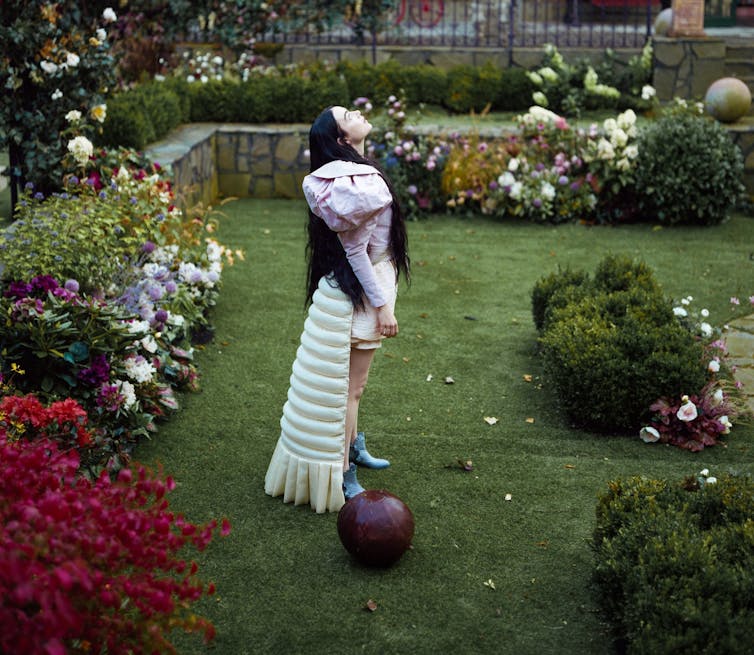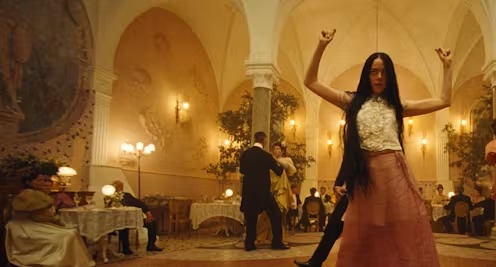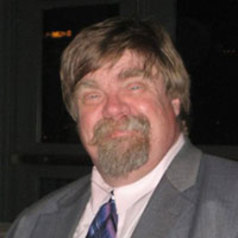At first glance the British composer Jerskin Fendrix (the stage name used by Joscelin Dent-Pooley) does not seem an obvious candidate for scoring Poor Things, now nominated for best original score at the upcoming Academy Awards.
The film, by acclaimed director Yorgos Lanthimos features an A-list cast including Emma Stone, who plays Bella Baxter, a woman brought back to life who must experience the world afresh.
Fendrix had no prior experience with composing for the silver screen or working with a director. When he was approached about the job he had released only one solo album, Winterreise (2020).
Yet it was just this album with its punk and pop aesthetic that caught the attention of auteur-director Lanthimos.
As such, Fendrix represents a newer generation of film composers, who are more likely to move in the world of rock, pop or alternative music scenes than score or conduct for a symphony orchestra.
Jerskin Fendrix’s Onigiri from the album Winterreise.
Underground scene
Lanthimos himself has admitted this was the first time he has worked with a composer.
Fendrix’s path to that point involved singing original songs in the underground/alternative Brixton music scene in South London.
His fast-growing reputation enabled him to stage a four-day festival at the much-vaunted Windmill Pub in 2018.
In that same year he tried his hand at electronic opera — a foreshadowing of film scoring? — through a setting of the absurdist turn-of-the-century play Ubu Roi by French writer Alfred Jarry. The Guardian described the music as “not just atonal but abrasive, brutal and grinding.”
Poor Things soundtrack.
Orchestras at the movies
In the era of epic film franchises like Star Wars, Harry Potter and Star Trek, the London Symphony Orchestra served as the go-to ensemble for soundtracks, with more people hearing the orchestra through these movies than live in concert.
It stands to reason that the shift from those sprawling cinematic universes to more character-centred stories like Killers of the Flower Moon and Poor Things necessitated a different sound ideal.
Three of the five film scores nominated for the Oscars this year are by composers who possess solid credentials in popular music: Fendrix, Ludwig Göransson (Oppenheimer) and the late Robbie Robertson (Killers of the Flower Moon).
Popular music collaborations
Göransson has collaborated with American musician and rapper Childish Gambino.
Robertson was renowned both for his solo artistry and earlier for his work with Bob Dylan and The Band.
To this list we might add such recent Oscar nominees as Radiohead lead guitarist Jonny Greenwood (The Power of the Dog), Nine Inch Nails band members Trent Reznor and Atticus Ross (Mank, Soul).
Each of these composers have contributed their unique blend of skills and expertise to the scores entrusted to them.
Fashioning something new
Yet none of them as “quirky” and “one of a kind” as the work of Fendrix for Poor Things.
According to an interview with the Oscar publication A-Frame, he and Lanthimos agreed “not to discuss any other composers, film scores or music in general” so as to create a sound unique to Poor Things.
That may be true, and yet Fendrix has indicated that he does have favourite film scores, including Tōru Takemitsu’s “breathtaking” music for Ran, (which re-imagines Shakespeare’s King Lear as a 16th-century Japanese epic) and the “phenomenally inspirational” classical mix in 2001: A Space Odyssey. These must have left some imprint on the composer.
In line with the desire to fashion something new for Poor Things, director and composer inverted the customary model of adding music once the film was “locked,” at the end of the creative process.
Fendrix actually started his work six months before shooting began — he based his music on the script and set designs rather than on the finished footage.
Breath and life
What he created also subverted scoring norms by relying on woodwinds — symbolic of breath and life — rather than strings, with bagpipes and organ thrown in.
Lanthimos approved the results of Jerskin’s efforts, which led him to take the unusual step of playing the music on set to establish the mood for scenes and characters.
From the opening of Poor Things we realize that we are participants in a fresh new world for cinematic sound, by a composer who confesses that he “had no idea what [he] was doing at any point in the process whatsoever.”

Fendrix’s score accompanies the character development of Bella Baxter, played by Emma Stone, a woman brought back to life who must experience the world afresh. (Searchlight Pictures)
Samples of acoustic instruments
Rather than composing from the synthesizer, Fendrix digitally — he says “surgically” — edited samples of individual acoustic instruments, whereby he could manipulate each part.
Such editing would not have been possible if he had taped an orchestra or ensemble at one place and time, a standard approach for recording film soundtracks.
The opening cue — associated with the lead character Bella — immediately immerses us into its sound world of the film: it begins with a six-note, pitch-bent pizzicato (plucked strings).
We might say that its shifting reflects the character’s initial awkwardness and uncertainty in the world, which the following lush string gesture seems to dispel.
Freshness, iconoclasm
However, if we listen carefully we realize the bending continues under the strings, suggesting the endurance of Bella’s curiosity and unique orientation to life even as she becomes experienced.
Her musical accompaniment expands, filling or creating sonic space of scenes as she physically, emotionally and intellectually develops in the film.
Yet the Bella theme persists throughout, the only leitmotif introduced by Fendrix.
Fendrix has brilliantly demonstrated that one does not need to follow standard film-scoring practices to express intense and profound emotions in music.
Perhaps the freshness and iconoclasm that he and his colleagues from popular music bring to scores are just what we need to inspire contemporary cinema and viewers.



 JPMorgan Lifts Gold Price Forecast to $6,300 by End-2026 on Strong Central Bank and Investor Demand
JPMorgan Lifts Gold Price Forecast to $6,300 by End-2026 on Strong Central Bank and Investor Demand  Gulf Sovereign Funds Unite in Paramount–Skydance Bid for Warner Bros Discovery
Gulf Sovereign Funds Unite in Paramount–Skydance Bid for Warner Bros Discovery  Jazz Ensemble Cancels Kennedy Center New Year’s Eve Shows After Trump Renaming Sparks Backlash
Jazz Ensemble Cancels Kennedy Center New Year’s Eve Shows After Trump Renaming Sparks Backlash  Trump Signals He May Influence Netflix–Warner Bros Merger Decision
Trump Signals He May Influence Netflix–Warner Bros Merger Decision  How Marvel’s Fantastic Four discovered the human in the superhuman
How Marvel’s Fantastic Four discovered the human in the superhuman  George Clooney Criticizes Trump’s Tariff Threat, Calls for Film Tax Incentives
George Clooney Criticizes Trump’s Tariff Threat, Calls for Film Tax Incentives  Nasdaq Proposes Fast-Track Rule to Accelerate Index Inclusion for Major New Listings
Nasdaq Proposes Fast-Track Rule to Accelerate Index Inclusion for Major New Listings  Trump Proposes Two-Year Shutdown of Kennedy Center Amid Ongoing Turmoil
Trump Proposes Two-Year Shutdown of Kennedy Center Amid Ongoing Turmoil 
































